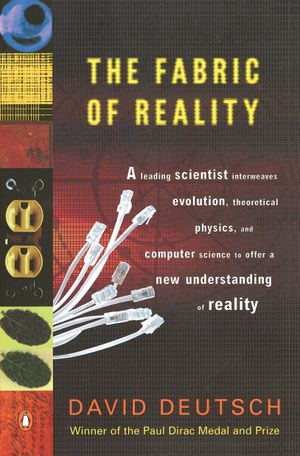
The Fabric of Reality: The Science of Parallel Universes – and Its Implications
by David Deutsch
read in Jan 2022
book info on goodreads
David Deutsch’s project that he starts in “The Fabric of Reality” is an ambitious one. His goal is nothing less than to develop a theory of everything or as he calls it a theory that explains the fabric of reality. Importantly, he does not abandon existing theories and try to come up with an entirely new theory of his own. Rather he tries to integrate four of the most sophisticated and powerful theories of our time.
First, the theory of quantum physics and the multiverse. A particular explanation of quantum theory, rich with illustrations and experiments, that is strikingly unintuitive and refreshingly different from common explanations taught in school, for example. His second strand of theorising that he tries to integrate with quantum physics is Popperian epistemology. Basic ideas of how we get to know things and cumulatively develop explanations about phenomena. Third, Darwin-Dawkins theory of evolution. He compares the cumulative development of knowledge an theoretical explanations with biological evolution. Finally, Turing’s theory of universal computation. Discussing primarily virtual reality and its possibilities in computing the multiverse he links together all four strands of theorising.
Understood individually the four strands are reductionist. They have explanatory gaps. However, taken together, they can form a unified explanation of the fabric of reality.
“Connections have been discovered between the basic principles of these four apparently independent subjects that it has become impossible to reach our best understanding of any one of them without also understanding the other three.”
Our deepest theories become so integrated with one another that they can only be understood jointly.
Deutsch’s book is already an interesting read based on the description of the four strands and the connections that he develops between them. Yet, the book is also interesting because it discusses basic ideas of philosophy of science. For example, Deutsch starts with a basic introduction about the nature of theory.
For Deutsch, what matters about a theory is its explanatory power. Its predictive power is only supplementary Deutsch’s focus on explanation and critique of induction resonate well with abductive approaches to theory building.
“We seek explanations when we encounter a problem with existing ones. We then embark on a problem-solving process. New explanatory theories begin as unjustified conjectures, which are criticized and compared according to the criteria inherent in the problem. Those that fail to survive this criticism are abandoned. The survivors become the new prevailing theories, some of which are themselves problematic and so lead us to seek even better explanations. The whole process resembles biological evolution.”
He argues that theories are becoming deeper and more general. Theories are superseding the myriad of detailed theories that come before them. Deeper and more general theories say more about a wider range of situations than several detailed theories did together. Deutsch explains this as two opposing effects of the growth of knowledge. The increasing breadth of theories and the increasing depth of theories. Importantly, he argues, depth is winning, which makes it not only possible to conceive of a theory of everything, but also easier to understand then several detailed theories.
Deutsch also offers a compelling, for a natural scientist, explanation of the different sciences, including the social sciences. Higher-level sciences (compared to physics) such as chemistry, biology, psychology, economics, and the social sciences are able to be studied and understood because of what he calls emergence. Higher-level simplicity and comprehensibility emerges out of low-level complexity. The idea of emergence also prevents us from simply using low-level physical theories to explain, for example, social processes. Lower-level theories have implications for higher-level theories and vice versa.
For him, questions of explanation and thereby theory are closely intertwined with questions about the acceptable criteria for reality.
“Not only do explanations change, but our criteria and ideas about what should count as an explanation are gradually changing (improving) too. So the list of acceptable modes of explanation will always be open-ended, and consequently the list of acceptable criteria for reality must be open-ended too. But what is it about an explanation - given that, for whatever reasons, we find it satisfactory - that should make us classify some things as real and others as illusory or imaginary?”
It is especially these last quotes about the entanglement of different theoretical ideas and the changing nature of what even counts as an explanation that made me think about the IS field. Are we at a stage yet where different theoretical ideas are coherently linked to one another? Will we ever reach such a state? Interestingly, the question of what counts as theory or explanation has been debated a lot recently. Although many of Deutsch’s argument about the four strands of theorising and his integration of them is highyl abstract, his more general discussion of philosophy of science and theorising is well worth reading in my opinion.